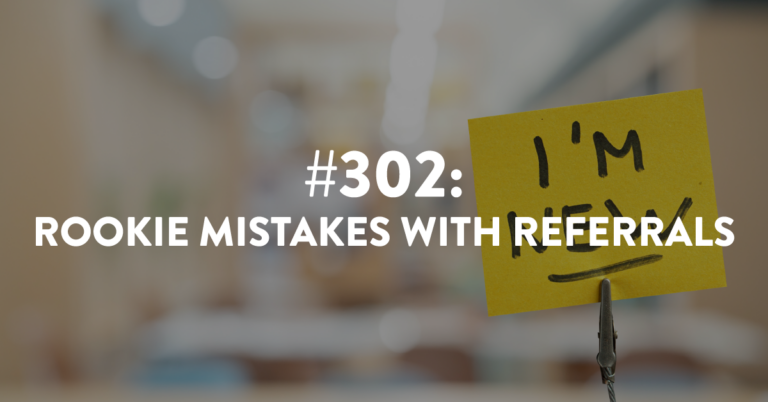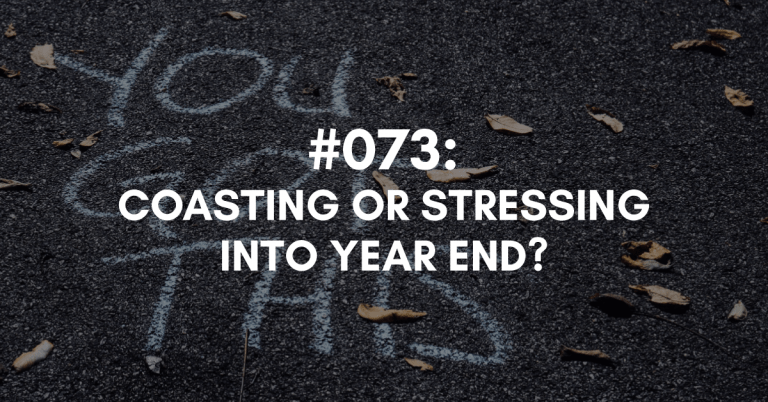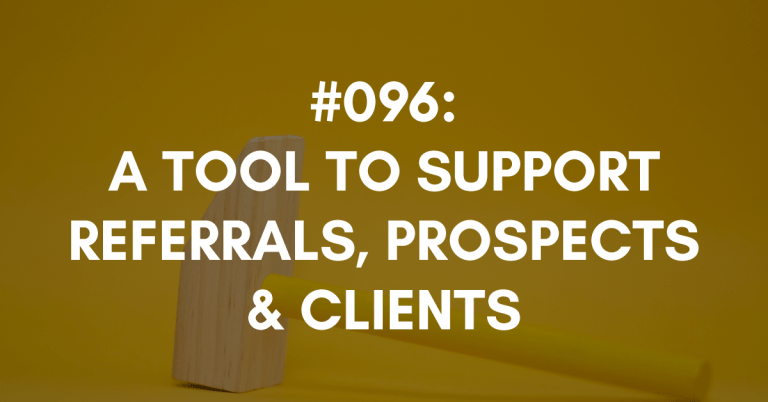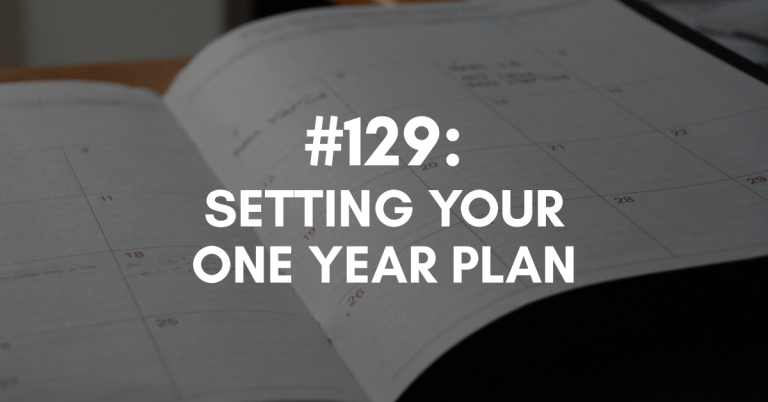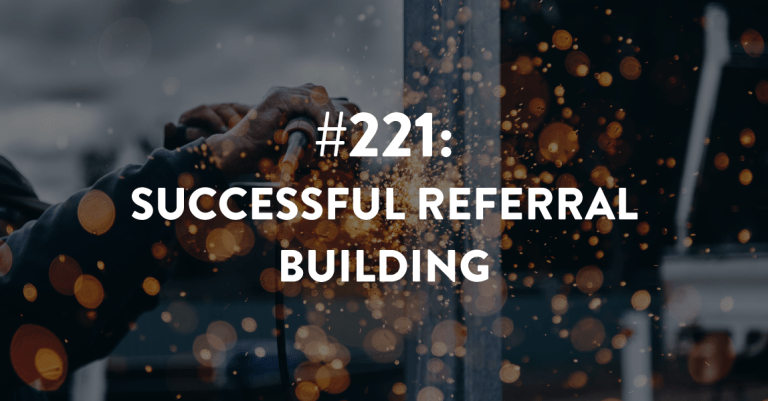Ep #280: Referral Q&A
In this Q&A episode, we dive deep into a question from one of my Referring Machines program participants. Her question is about overcoming certain challenges in getting referrals in a specific service area.
I break down the question into four distinct parts and unpack each one to help you understand the underlying factors and strategies to move forward with getting referrals. And lucky for you, you’ll get to hear exactly what I told her.
My answer to her question is packed with actionable strategies and insights. You will learn how to navigate the sensitive nature of personal services and create an environment where clients feel comfortable referring you. Don’t miss this game-changing episode!
Links Mentioned During the Episode:
Check out the How to Turn Clients and Contacts into Referring Machines online program. It’s an online program complete with a workbook, mini-video lessons, templates, and scripts to download.
Apply now to join our Building a Referable Business™ coaching program.
Next Episode:
Next episode is #281, where we’re going to talk about something that may be holding back your referrals.
Download The Full Episode Transcript
Read the Transcript Below:
Stacey Brown Randall: Every 10th episode, I break down questions submitted from listeners just like you, and sometimes even from those in my online programs or my coaching program, Building a Referable Business. So since this is a 10th episode, here we go.
Hey there, and welcome to episode 280 of the Roadmap to Referrals podcast, a show about helping you build a referable business. I’m your host, Stacey Brown Randall. My journey from a business failure to a successful business now 10 years in, I know generating referrals naturally and consistently has made all the difference. Working with clients around the world, we leverage the science of referrals, protect relationships above all else, and help you build a referable business.
Sometimes I get a little surprised when a 10th episode rolls around. It’s like, I know they’re coming, like every 10 episodes, I do a Q&A episode, but then all of a sudden, it’s like, oh my gosh, wait, I’m already recording the next question and answer episode?
I think that has a lot to do with the fact that I do batch record these episodes. So I am recording ahead, but it’s still, it’s like, oh my gosh, 10 whole weeks have gone by since the last time I did this, which means more than two months. It’s just crazy.
But here we are again, episode 280. It is a question-and-answer episode. And I’m actually going to answer one question for you today because I think it’s one I really want to spend some time on.
It was actually a question that was asked from someone who was taking my Referring Machines online program. So the Referring Machines program, the full title of it is, “How to Turn Clients and Contacts into Referring Machines.” But that’s super long. So we call it Referring Machines or RM for short.
Now, if you’re a brand-new listener or you haven’t really been with us for that long, I just want to break this down for you. You hear me talk a lot about my coaching program, my Building a Referable Business coaching program. And that coaching program is where you get access to all of the strategies, plus you get one-on-one access to me, and you get access to me on a weekly basis when I answer questions for my coaching clients.
And it’s called Building a Referable Business, or of course, we shorten everything, so we call it BRB. So you hear me talk a lot about that. But it’s not the right place for everyone to start. And in some cases, it may not be the right place for you to eventually join.
Sometimes, I have folks who just need one strategy. They’re like, hey, I don’t have any referral sources, and I just need some people to start referring me.
Well, that strategy is taught in the Referring Machines program. Now, of course, the Referring Machines program, that strategy, is a part of the overall coaching program. And the coaching program, we call it the whole enchilada for a reason, because you get access to everything.
You get access to all 19 strategies. The weekly Q&A sessions are like office hours. You get one-on-one milestone calls with me. You get an onboarding call. You get to come to a two-day retreat with me live and in-person. There’s like a whole lot in the coaching program.
But we do have some of our strategies, some of the training programs that are available for you just to purchase as a one-off. And Referring Machines is one of them. And it’s one of our foundational strategies that we believe every business needs to know how to put into place is the ability to turn someone who’s never referred you into an actual referral source.
Another program we have available like this that you can just buy by itself, a la carte, is our Growth by Referrals program. It’s actually the program the book, Generating Business Referrals Without Asking is from. And that program called Growth by Referrals, it’s when you have referral sources and you want to get more referrals or generate more referrals from them.
So, of course, and we have some other ones, but those are kind of like the big two foundational ones. And spoiler alert, we may be releasing another foundational strategy program very, very soon. So stay tuned. You’ll hear more about that on the podcast first, I promise.
Okay, so when I talk about receiving a question from a client who’s going through Referring Machines, that’s the program that they have chosen to go through and that is, usually it’s the one program they’re going through. That doesn’t mean they may not decide to invest in other programs or upgrade into the coaching program. But this is a client who has access to the referring machines program.
And when you come into one of my online programs, we have an online portal where you find your training. And then, of course, within that online portal is where we also have our online community, which is great to do welcome posts for just, you know, it’s just for those who are going through the online program.
It’s a chance for them to have a welcome post, introduce themselves, talk a little bit about themselves so people know who they are and where in the world they are and what they’re trying to accomplish with whichever of the programs that they have invested in. And it’s also their place to ask questions.
And so this question was posted in our online community portal function from this one Referring Machines client. And her question’s so good and it’s one of those questions that it needs to be unpacked because there’s so much that’s just baked into that thought about like, you know when you get those questions that you’re like, oh, that question comes from somebody else telling somebody how to do what they’re supposed to do. And I’ve got to go in and unpack that mentality.
So I’m going to read you the question that this person posted. Her name is Leah. She’s from Australia. She’s one of our international clients, which we love. And she was referred to me by one of my referral sources that is actually in Australia. She’s also referred me a CPA that I’ve worked with in the past as well. So she’s an awesome, amazing referral source. Shout out to Naomi Gora. She’s also been on the podcast before as well.
And so the question that came in, it wasn’t just like, oh, here’s three sentences, and this is going to answer your question. There were four distinct parts to that question that I answered, like four distinct parts of my answer that I wanted her to understand.
Because if I didn’t dive into unpacking all of the junk that was wrapped up in her question, she was never going to be able to push forward and do what the Referring Machines program was teaching her. And I could read it in her question, and I was like, nope, I’m going to take some time, and I’m really going to answer this.
So here’s what I want to do. I’m going to read you her question, and then I’m going to give you the answer that I gave her, all four parts. And some I’m going to unpack a little bit more for you, and some are pretty easy. But we’re going to spend this episode on this question. Here we go.
So here’s her question. Hi, Stacey. I’ve recently had a few people, one is a marketing expert, say a problem I might face is clients not being willing to tell people they work with me as a life coach because they feel it is so personal and private. They might feel the same way they do about divulging that they are seeing a psychologist, which is an unfortunate scenario in our society.
Very true.
So I’m now wondering if you have other clients working in a service area like mine, and if they’ve come across this problem, like is it even real, and how it could be overcome. Is it a matter of going through what you talk about in the Referring Machines program, where you work out who is the right fit as a referral source? Thanks so much, Stacey. Leah.
Okay, so here’s the thing I want to just start with, and this is actually how I started my answer as well with her, and I’m going to go ahead and just say this in advance. I’m going to apologize now if I get on a soapbox, because sometimes I read things like this and I’m like, oh my gosh, the advice that some people give in the name of telling others that their way is the best way.
And I guess on some level, I mean, I tell people don’t ask for referrals and my way is the best way. So I guess I understand where this is coming from. But I guess my issue is, is when it has damaging impact to how somebody will view their business or how they will or won’t try a tactic.
So this is what I said to her. Hey, Leah, excellent question for us to unpack. Here’s what I want you to keep in mind. Number one – are the people who told you that your clients may not refer you because you’re a life coach, your actual clients? it is really important you consider the source. As in, who told you? Who was the person who gave you that piece of advice?
Now, she specifically said that one was a marketing expert. So maybe that marketing expert is thinking, well, you’ve just invested in referrals, so now you won’t invest in whatever I’m selling. I don’t know. Maybe that marketing coach was just like, hey, something to keep in mind, right?
Like, I don’t know where this came from, and this isn’t against anybody who does anything. I mean, we all need marketing, and we all need prospecting, and we all need referrals.
And so I think it’s important that we just kind of keep in mind the situation, and the mindset, and the context in which someone is giving you advice about your business, even when you’re listening to me. It is important for you to pay attention. Discernment is very, very important.
So I said, while there is a stigma for getting help, not everyone feels that way. There are those who will shout it from the mountaintops when they find someone who helps them. But here’s the thing. Now, your clients may not tell a stranger how amazing you are and then refer you to that stranger, but many will share and refer you to those they are the closest to.
So there is a perception that, depending on the type of work you do, in this case, working with somebody as a life coach, or using the other example she gave, like a psychologist or a therapist, that clients may not be willing to share with, like, everybody that they’re working with you.
And that is true. It’s also true when you’re working with a CPA or an attorney. We don’t share with everyone we meet, whether we know them really well or they’re a stranger, “Oh, I got to tell you about this great new attorney I’m working with.” or “Oh, I got to tell you about this great new life coach I’m working with.”
We don’t do that in general. So when someone tells you that clients may not be willing to refer you based on the work that you do, what I think really needs to be understood is they won’t tell strangers. They probably won’t refer you to strangers. Say, by the way, I’m working with this amazing life coach. I don’t know you, person standing in line behind me at Starbucks, but I’m working with this amazing life coach, and you should go call her. That’s not to be expected.
But that’s not how referrals work in the first place, right? Like, this goes back to understanding how referrals work. And how referrals work is that I’m having a conversation with someone, and they are having a problem. And I think, oh my gosh, I know how to help you solve that problem, friend. You need a life coach. And I happen to know the perfect person to refer you to. That’s how referrals happen, right?
This marketing person or whomever else, right? I’ll get off that stick right there. But like, these folks are telling you, hey, your clients may not refer you. They’re under the impression that she’s going to run around asking everybody to refer her.
And A, don’t do that. You’re right if you do that, they won’t refer you. But the other thing is that we recognize the science behind referrals. And the science behind referrals and what that ultimately looks like is really important to understand what’s happening when a referral is being given.
So it’s not like she needs her clients to refer her to 10 other people in the first two months that they’re working with her. We don’t set those expectations on our clients either. And so the idea here is understanding that clients will refer you, but not if you’re constantly asking them, and not if there’s not someone to refer to you, and not if there’s not an opportunity.
Remember, with referrals, you need opportunity and desire, and you only control desire. So it’s making sure you have the right relationship with your referral sources, whether they be clients or not, so that when that opportunity presents itself, they are referring you. And it is why it’s important to recognize, well, who are your best referral sources, so that there is more opportunity as well.
But so the first thing that I wanted to just kind of make sure that Leah understood is that, listen, there’s a ton of advice out there. And there is some advice that’ll work for some folks and it won’t work for you. And there’ll be some advice that works for you that doesn’t work for someone else. That doesn’t mean there’s anything wrong with what you’re necessarily doing.
But it’s also important to recognize that we’re not expecting our clients to refer us to strangers. We’re expecting them to refer us to people who need a life coach and that because they love working with you, they would be willing to do it.
But that leads us to the second point that I brought up to Leah as well. And I said, here’s the other thing. Not all of your clients will refer, no matter how much they love you and the work you do together. And that is actually regardless of your industry.
In the program Referable Client Experience, which is another one of our foundational programs, I discuss how you should expect 20 to 30 percent of clients to refer you and then work to increase that. And I do talk about that a little bit in Referring Machines as well.
So think about your clients. If you have 100 clients, well, then we’re aiming to have 20% to 30% to refer you and then work to increasing that. Some are less than that, and some start off higher than that. But there’s actually not this magical pill that every client takes the minute they start working with you, and poof, they magically will refer you.
Trust me, if every client referred you as often as you needed them to, I would not have a business. Like, that is the reality. But that’s because a client doesn’t owe you referrals. They owe you money for a job well done. And how we impact their desire to refer us, and if they come across opportunity to refer us, matters.
So the idea that, well, your clients aren’t going to refer you because of what you do, I don’t need all my clients to refer me. I need to have the 20% to 30% that do refer me and refer me consistently, and then I can work to cultivate new people referring from there. And that is where Leah needed to start. She needed to stop worrying that all of our clients weren’t going to refer her. They never were to begin with.
We’re looking for a smaller percentage and then increasing that. And making sure we understand exactly what that looks like as we kind of move up in terms of the clients that do refer.
So, yes, well, there will probably be people who are like, I’m never telling a soul that I’m working with a life coach. Of course. But our statistic equates for that. Like, we know that’s going to happen. We know that there will be people who love us and don’t refer us. But we’re not looking for 100% referrals from every single client or 100% of our clients to refer us. We are looking for those that will, and then we cultivate that right relationship to increase that number. Okay, let’s talk about the third thing.
Hey there, pardon the interruption. Let’s change your business in 2024. Let’s work together to double, triple, or quadruple your referrals. I want you to join me inside my coaching program, Building a Referable Business, where you will have access to this training we’re talking about, Referring Machines, plus 18 others. Not that you’ll probably need them all. Find all the details of the BRB program and the link to complete your application at StaceyBrownRandall.com/referable. Now back to the episode.
Okay, here’s the third thing I told Leah. Number three, it will be important for you to cultivate non-client referral sources, meaning COIs, centers of influence. And then I gave her the example, like Naomi Gora, who referred Leah to me, and she is a COI referral source of mine. So Naomi’s never been a client, but she’s referred multiple people to me.
One of the lessons in Referring Machines is determining who talks to your ideal client before they get to you. I talk about this from that perspective of who is upstream from you. When you are working with your clients, who’s talking to them one layer above you or slightly upstream from you?
And the way we talk about this upstream referral piece is the idea that there are people who will talk about the problem that you can solve before you talk about it with that client or with that prospect. So there are some people who are having conversations with your ideal client and they are uncovering the problem that you can solve.
Who are those centers of influence? Who are those business owners? Who are those folks who are swimming slightly upstream ahead of you in dealing with your clients?
So an example is when I was a business coach, I referred many clients to a bookkeeper. I was swimming upstream ahead of the bookkeeper. Because as a business coach, I helped my clients realize their issues of needing to outsource their books before they knew it, or they knew it, and I agreed with them, and then I helped them find a trusted resource.
So I was always in this unique position to refer the bookkeeper clients as a business coach. So I am a center of influence, referral source, in this case, to the bookkeeper. And it’s understanding that, and it’s just this concept of who swims upstream from you, like who’s a little bit more upstream that’s talking to your clients about their problems that you can solve before they get to you, and you want to make sure that they are referring those people to you.
And so I went on to tell Leah, when you are working through the identification of potential COI, center of influence referral sources, you need to spend some time in that area coming up with possibilities. Because sometimes it doesn’t just magically reveal itself.
Most people wouldn’t think, oh, a business coach. There’s actually a lot of people business coaches can refer to when they’re unpacking businesses and their problems. But you’ve got to spend some time thinking about, hey, who’s talking to my ideal prospects before I talk to them and helping them uncover their problems.
And here’s the fourth thing I told her. Remember, no matter what, you’ll kiss a lot of frogs before you find your princes and princesses of getting someone to the point of referring you who has never done it. Getting someone to the point of referring you who has never done it.
Please guys, this takes time. These are humans. So we have to have patience.
And here’s something else I want you to understand. I have people who ask about the Referring Machines training, and they’ll say, is it a framework or like a structure of how I reach out to people and how often I should reach out to them? Like, are you giving me that framework? And are you telling me, like, what am I talking about in these conversations?
And the answer is yes. But it usually doesn’t, like when you first look at what I’m teaching you inside Referring Machines, like the structure, the framework, like how do you reach out, and what do you say in that first conversation, and what do you not say, which is actually harder for most people than what you do say. And then there is follow-up that happens, a structure to that follow-up that happens.
What a lot of people fail to recognize, is that this isn’t about having a structure of, I’m going to reach out to these people every three months and I’m going to set a reminder in my CRM or in my calendar that, hey, it’s been 90 days, reach out to these three people.
If that’s your structure and that’s your process, even if it is just like, hey, how’s it going? You’re missing the point on how you actually cultivate someone into a referral source. Your ability to know what your objective of those conversations is and how you’re supposed to meet that objective, which will not feel like you’re doing what you’re supposed to, because it’s not going to feel like business to you. It’s not going to feel like I’m making business happen for me, because you’re not. Because you’re not focused on yourself in those conversations.
And that is really hard for people who are like, wait, if I’m going to have 15 conversations over the next month or two, I need to make sure that those conversations end with people knowing how they can support me.
And then you’re doing it wrong.
If you go into the idea of, hey, you’ve never referred me, and now I’m gonna talk you into referring me, or I’m gonna talk to you and tell you everything that I do so you’ll refer me, or I’ll just have the same chit-chat conversation of how’s it going, how’s it going, and wait until you ask me about business, you’re doing it wrong.
The objective, the mindset that you bring into these conversations will ask you to check your ego at the door and your expectations for how fast this will move. And that is hard for some people. Some people are like, I just need it today. All about me. Let’s get it going. Not going to be successful in that environment.
The other thing is when you plant referral seeds within those conversations and what that ultimately looks like and what allows you to turbocharge this process to getting someone to ultimately send you that first referral.
It takes time. Guys, these are humans. These are people.
It’s why one of the things we talk about when I work with folks is that I’m interested in protecting your relationships, not exploiting them. I’m not interested in trading on your relationships or exploiting them. I’m interested in protecting them.
Yes, we are a business and ultimately, we do want people to refer us, but we will go about it in a way that is honest and respectful and protects relationships. If you come into this and you’re like, I need in the next 60 days, 15 people to start referring me and I’m just gonna go and hammer them over the head, this is not the program for you, and I am not the person for you.
So, you’ve got to have a little bit of time and you’ve got to have some runway to be able to effectively make this work.
So, it was an amazing question that Leah asked. I appreciated her vulnerability, and I appreciated the fact that we have this Q&A part of the portal for those that are just in my online programs. I appreciate that they get in there and they do ask questions as well.
So if you’re interested in the Referring Machines program or maybe in the whole enchilada of joining the coaching program, I’ll put the links to those so you can go check those out in the show notes page for this episode, which can be found at StaceyBrownRandall.com/280.
And of course, if you have any questions, if Referring Machines is the right program for you or the right program to start with, by all means, you can always send me an email or just DM me on Instagram or LinkedIn.
Okay, coming up next is episode 281, and we’re gonna talk about something that may be holding back your referrals. Until then, you know what to do, my friend. Take control of your referrals and build a referable business. Bye for now.



